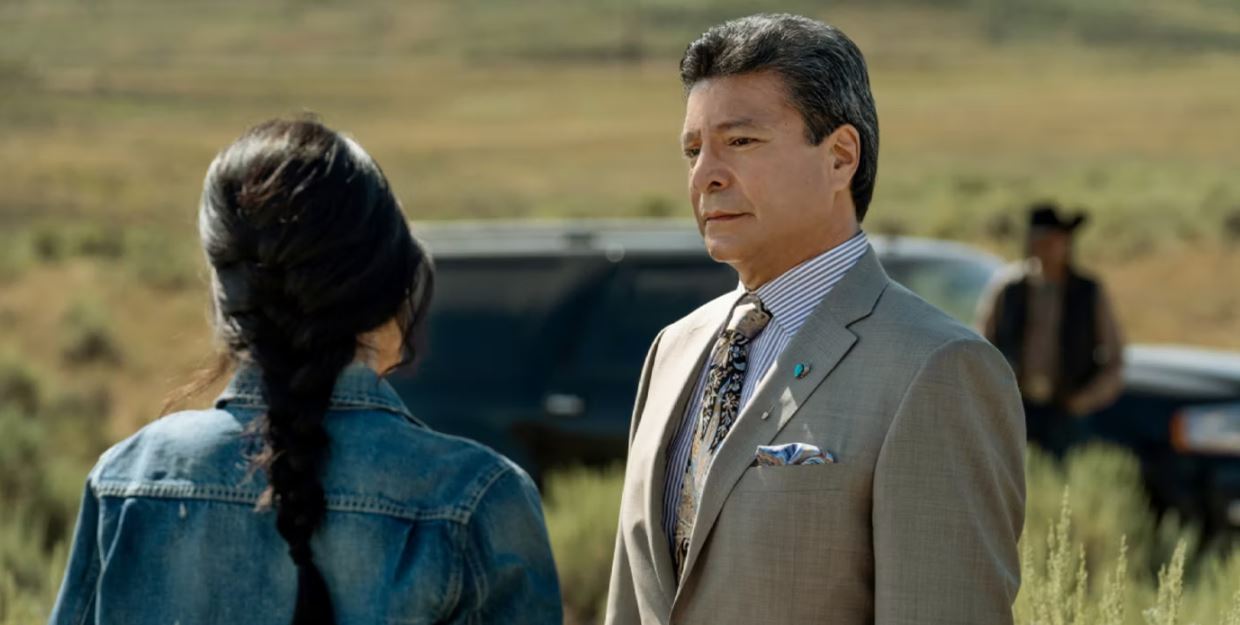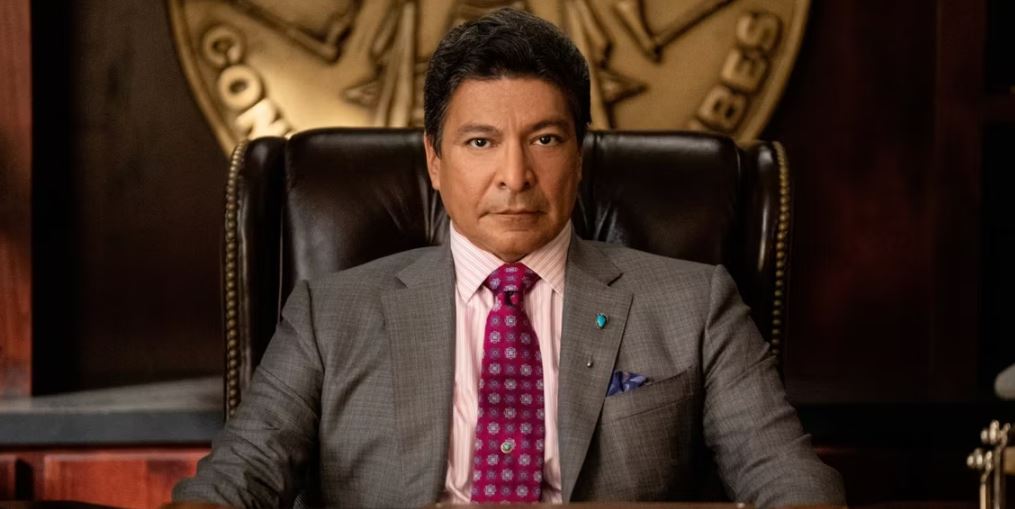On Yellowstone, the Dutton family always gets the best stories, the most interesting lines, and the most to do narratively. Given that the series centers around John Dutton (Kevin Costner) and his broken family, it makes sense that others would generally take a back seat. Unfortunately, that means some of Yellowstone’s most interesting characters are often tossed to the wayside in favor of another Beth (Kelly Reilly) and Jamie (Wes Bentley) tumble. The chief among these often maligned characters is none other than Gil Birmingham’s Thomas Rainwater, who deserves much more than Yellowstone has to offer him.
Chief Thomas Rainwater Needs More to Do on ‘Yellowstone’
While Monica Dutton may be the Dutton with the most unrealized potential, Thomas Rainwater is certainly the Yellowstone character we’d like to see more of, especially given Gil Birmingham’s superior acting chops. Not only is Rainwater the high chief of the Confederated Tribes of Broken Rock, but his entire life’s goal is to elevate his people and bring generational wealth back to them. In many ways, what Rainwater wants and what John Dutton wants are the same, just on opposite sides of the coin. “We want the same thing, but for very different reasons,” he tells the Dutton patriarch in Season 3. So why is it that John Dutton is the one who gets all the good screentime on Yellowstone?
Possibly the most egregious sin that Yellowstone has committed is its inability to do anything particularly compelling with Thomas Rainwater. In “Daybreak,” the show’s very first episode, Rainwater mentions how, until he was 18 years old, he believed himself to be Mexican, but upon learning of his Native American heritage, it completely changed the course of his life. From there, he became Ivy League educated and returned to his people to take back what he believed to be theirs. We’ve seen countless flashbacks to John, the Dutton kids, and even Rip Wheeler’s (Cole Hauser) lives from before they were who they are today, but we have yet to see one focus on Rainwater’s fascinating upbringing. If any character deserves a more in-depth look, it’s Thomas Rainwater.
Along with that, we often hear about the positive things that Rainwater has done for his people. He has, on more than one occasion, mentioned how he is involved with his community, but we have yet to see any of that unfold on screen. In the first episode, Rainwater meets with Senator Huntington (Jill Hennessy) concerning his plans for revitalizing his people, but the Senator is never seen again, and that part of the story quickly dies out. In the past few seasons, Moses Brings Plenty’s Mo has been given more screen time on the series (which is wonderful), yet Rainwater is still mostly relegated to standing around and menacingly threatening those who would take or abuse their land (which, to be fair, is all John Dutton seems to do too). If not that, then Rainwater is helping Kayce (Luke Grimes) with his vision quests or helping Monica (Kelsey Asbille) work through her own issues, which admittedly did highlight a much-needed side of the tribal leader.

‘Yellowstone’ Has Told Important Native-Led Stories in the Past, but Never With Rainwater in the Lead
Up to this point, most of Yellowstone’s most important and impactful Native-led stories have centered around Monica Dutton. The episode “I Killed A Man Today” in particular is all about helping end the violence against Native women both on and off the reservation. This is an issue that series creator Taylor Sheridan previously explored in his feature film Wind River (which also featured Birmingham and Asbille), and an important one to continue talking about until real change is made. While Monica is the obvious choice to be instrumental in this arc, Thomas Rainwater, who is the leader of the people of Broken Rock, doesn’t do much but support her from behind the scenes, showing up only once the danger has been dealt with.
And this is part of the problem with Rainwater’s arc on Yellowstone; he doesn’t really have much of one. Rather than make Rainwater a complex character, ala John Dutton (or even some of his ranch hands, such as Jefferson White’s Jimmy Hurdstrom), the show treats him as an afterthought that they get to whenever things get heated between the Duttons and some new real estate mogul. It’s only then that Rainwater decides if Dutton’s enemies should be allies or threats to his own grasp of power. Now, there’s something to be said that Rainwater is generally portrayed as a more dynamic and well-rounded character than most Native inserts in Western dramas, but he still lacks the creative agency to stand tall on his own.
Perhaps the reason Taylor Sheridan hasn’t dived deeper into Rainwater’s history and fought to better note his motivations and daily meditations is out of respect for Native American culture. Bringing to life the Native traditions for Kayce’s vision quest in the Season 4 finale “Grass on the Streets and Weeds on the Rooftops” was a tough thing to do. The show aimed to be respectful of the sacred tradition while still showing enough that audiences understand what’s happening. “It’s something that nobody has ever seen before on television,” Birmingham noted in a behind-the-scenes featurette. “To find a way to share it in this context, we were just elated about.”
Chief Rainwater May Need to Choose a Side on ‘Yellowstone’
But while Yellowstone seems to be keeping the sacred traditions somewhat private, that doesn’t mean that the show can’t delve more into Rainwater’s own backstory and daily life. We see a lot on the Yellowstone Dutton Ranch, which is part of why so many of the ranch hand characters have become fan favorites in recent years, but the same isn’t true for the folks on the Broken Rock Indian Reservation, though it should be. Rainwater’s story is just as important as John Dutton’s, even when they’re working on the same side.
“We still have chess to play, you and me, and I refuse to surrender my queen,” Rainwater notes to John Dutton in Season 4, reminding us that although they’ve been friendly recently, there’s still an underlying tension beneath the surface. For many seasons now, Dutton and Rainwater have danced back and forth between being enemies and uneasy allies. Back when John Dutton was dying, it made sense to focus more on his story as he fought to preserve his family legacy, but now that he isn’t, a more equal partnership is desired. In recent years, it seems more like Rainwater and Dutton have been becoming friends, if you could even use the term, rather than adversaries. While peace between their respective peoples would be a good goal to work towards, and perhaps that’s part of Sheridan’s overarching plan here, the continual nods to a greater battle between Rainwater and Dutton keep us on edge.
With Yellowstone coming to an end very soon, with only one more batch of episodes yet to air, there must either be peace or war between Rainwater and Dutton. The series begins with the two factions at war, with Rainwater vowing to take everything from the ranching mogul. But ever since, the lines between them have blurred. If peace, or at least some compromise, is to be had, then the series should lean in that direction. But if war is imminent and unavoidable, then it’s time for Rainwater and Dutton to stop pretending and get on with it. Birmingham certainly has the acting chops to step things up going into the back half of the final season.

Gil Birmingham’s Previous Work With Taylor Sheridan Shows the Character’s Potential
If you didn’t already know, Gil Birmingham’s extensive filmography has partnered him up with series creator Taylor Sheridan on more than one occasion before Yellowstone. Previously, Sheridan had written the neo-Western crime drama Hell or High Water, which featured Birmingham in a supporting role opposite Jeff Bridges as a Texas ranger of part Mexican and part Native American descent. Birmingham’s role in the film is deeply important to the overarching narrative, and his character even serves as the springboard for Bridges’ in the final act. If anything, it proves that his work as a supporting man is only the tip of the iceberg. Birmingham’s performance in Hell or High Water is only further highlighted by Sheridan’s aforementioned directorial debut, Wind River.
With a tough ending that makes one want to sit in complete silence, Birmingham has a smaller role here than in his previous Sheridan-penned neo-Western, but it’s just as meaningful, if not more so. In any case, it’s no wonder the cowboy actor-turned-filmmaker opted to give Birmingham his chance to carve out his spot on the small screen. If anything, these supporting roles prove that Birmingham has what it takes to be a leading man, or at least master a main cast role in an ensemble like Yellowstone. By no means is Birmingham not living up to his prior roles. His work on Yellowstone is as great as ever, though the writing of his character may occasionally suffer.
‘Yellowstone’s Prequels Better Elaborate on Native American Stories Than the Flagship Series
Strangely, it seems as if the Native American characters in Taylor Sheridan’s other shows have more to do than Rainwater does on the flagship series. This is especially true of the prequels 1883 and 1923. Showing the differences between the Crow, Comanche, and Lakota peoples, 1883 chronicles the dangerous journey by settlers from Texas to Oregon (well, Montana for the Duttons), all the while accurately portraying the groups of people they encountered along the way. Going a step further, 1923 introduces Rainwater’s grandmother, Teonna Rainwater (Aminah Nieves), who is forced to escape the Roman Catholic boarding schools and the abusive priests and nuns who live there.
If Teonna Rainwater shows anything, it’s the dramatic potential that Thomas Rainwater has in the present day. Sure, the challenges and hardships are quite different from what we saw in 1923, but there’s still a lot to explore on the reservation. Other contemporary dramas such as Longmire, Reservation Dogs, and Dark Winds have expertly crafted Native characters that defy stereotypes and Western clichés while also being well-rounded individuals. So far, we have yet to see that from Thomas Rainwater, but many of us who have been with Yellowstone from the very beginning would like to.
